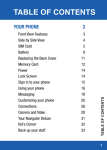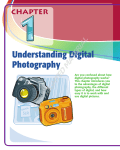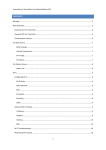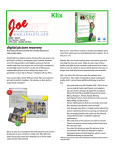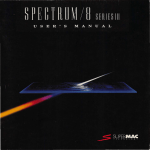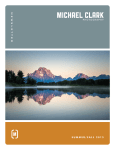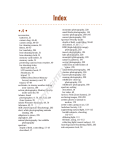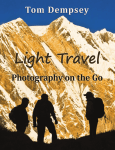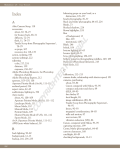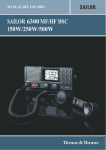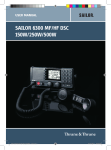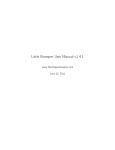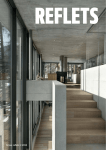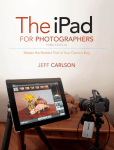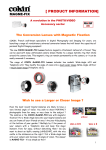Download Wiley Digital SLR Cameras and Photography For Dummies, 4th Edition
Transcript
Index Adobe Photoshop Elements 9.0 advantages of, 231–233 disadvantages of, 233 overview, 231 Adorama, 334 advanced amateur/semi-pro dSLR cameras, 63 air blowers, 98 Allway Sync, 81 alternative image editors, 233–234 ambient lighting, 339–340 amp glow, 147 amp noise, 147 angles choosing creative, 303–304 subject flattering, 207 animal photography, 138 anti-aliasing, 38, 340 anti-dust, 71 anti-shake, 72 aperture (f-stop) choosing, 301–302 ND (neutral density) filters, 84 overview, 36, 42–44 Aperture Priority mode, 115–116 Apple Camera Connection Kit, 93 architecture photography composition, 215–217 framing, 217 lighting harsh, 216 mixed, 216 overview, 215 too little light, 216 too much light, 216 uneven, 216 overview, 212 perspective, 212–214 prime lenses, 129 tilting the camera, 213–214 archiving RAW file format, 175 CO PY RI GH TE D accessories close-up equipment, 98 for connectivity, 93–97 filters, 83–86 flash unit, 90–92 GPS (Global Positioning System), 96–97 second/spare camera, 97 sensor-cleaning kit, 98 tripod, 86–90 across the frame, subject moving, 191 action photography close up/distant subject, 191 diagonal motion, subject moving in, 191 with flash, 194 manual focus, 119 panning, 191–193 peak action, 193–194 relative speed of subject, 191 shutter lag first-shot delays, minimizing, 186–187 flash delays, minimizing, 188–189 minimizing, 185–186 overview, 182–183 shot-to-shot delays, minimizing, 187–188 sources of, 184 stopping action, 190–191, 319–320 toward the camera, subject moving, 191 add-on battery pack/grip, 189 Adobe Camera Raw, 149, 178 Adobe Photoshop CS5 advantages of, 228–229 Content Aware tools, 228 disadvantages of, 230–231 overview, 226–227 Puppet Warp tool, 228–229 TE •A• MA 3D photography, 71 RI AL • Numerics • 352 Digital SLR Cameras & Photography For Dummies, 4th Edition Askey, Phil (Digital Photography Review), 329 atmospheric conditions and telephoto lenses, 140 Auto Color control (Photoshop), 247 Auto tools (Photoshop), 242 automatic focus, 120–122 available lighting, 339–340 axial chromatic aberration, 342 •B• background adding new, 274–276 composition, 204–205 out-of-focus, 134–135 backup media, 78–79 balance in travel photography, 220 balancing lighting, 116 sky and foreground, 84 ball head tripods, 89 barndoors, 296 baroque photography, 323–324 barrel distortion, 214, 258 basic dSLR cameras, 59–61 basic image editing, 306 Bayer, Bryce, 39 Bayer pattern, 39 B&H Photo, 334 Bibble Pro, 178, 180 blooming, 37, 104 blower bulbs, 98 blurring (selective), 238, 254–256 bokeh, 134–135 bracketing, 111, 340–341 bridge (transitional) cameras, 65–66 brightness, 346–347 Brightness/Contrast controls (Photoshop), 242 buffer memory, 48, 187–188 built-in dust removal system, 158 built-in HDR, 71 burning, 343 burst (continuous) shooting mode, 65, 71, 186, 189–190, 300 Busch, David D. eBay Myth Buster, 334 •C• CA (chromatic aberration), 214, 258, 342 camera shake image stabilization, 149, 153–155 myths about, 150 overview, 149–150 solutions for, 152 testing for, 151–152 Canon cameras, 58 image stabilization, 153 lenses, 140 capacity of memory cards, 74, 75–76 Capture One Pro, 178 card reader adapters, 78 catadioptric telephoto lenses, 135 categories of cameras advanced amateur/semi-pro dSLR cameras, 63 basic dSLR cameras, 59–61 bridge (transitional) cameras, 65–66 enthusiast dSLR cameras, 62–63 EVF cameras, 65–66 mirrorless cameras, 65–66 overview, 59 professional dSLR cameras, 63–65 superzoom cameras, 65–66 CCD (charge-coupled device), 38, 69 CD/DVD burners, 78 center of interest, 203 center weighted metering, 110 changing environments, resolution in, 298 chromatic aberration (CA), 214, 258, 342 chrominance, 166 circular polarizers, 85 cleaning sensors, 25 Clone Stamp tool (Photoshop), 251–252 close-up equipment, 98 close-up images action photography, 191 flash photography, 188 close-up (macro) photography manual focus, 119 prime lenses, 130 telephoto lenses, 138 cloud storage, disadvantages of, 81 Index CMOS (complementary metal-oxide semiconductor), 38, 69 Cokin, 86 Color Balance sliders (Photoshop), 247 color correction, 238, 247–249 CompactFlash (CF) memory card, 48, 74, 75 Composer/Composer Pro (Lensbaby), 141 (compositing) combining photographs, 276–282, 306 composition architecture photography, 215–217 background, 204–205 center of interest, 203 horizontal, 203–204 intent, knowing your, 203–205 landscape photography, 217–219 message, knowing your, 203–205 overview, 202–203 point-and-shoot cameras and dSLRs compared, 201–202 portrait photography, 206–209 publicity and public relations (PR) photography, 210–211 Rule of Thirds, 205–206 subject, distance and angle to your, 204 subject arrangement, 204 travel photography, 219–221 vertical, 203–204 viewfinder, with a more accurate, 11–12 compression, 138 computer correcting images without, 28 resolution for computer work, 300 connectivity iPad apps, 93 smart phone apps, 93 tablet apps, 93 uploading through smart phone, 96 through tablet, 96 to web, 95 to your computer, 94 Wi-Fi transmission, 93–96 Content Aware tools (Adobe Photoshop CS5), 228 continuous autofocus, 121 continuous shooting mode, 65, 71, 186, 189–190, 300 contrast detection, 46 Control Freak (Lensbaby), 142 cookies, 296 Corel Painter 12, 234 Corel PaintShop Photo Pro X3, 234 Corel Photo-Paint X5, 233 crop factor, 52–54, 133–134 Crop tool (Photoshop), 241 cropping, 32, 237, 238–241 Curves dialog box (Photoshop), 242, 246, 248 •D• DCT (Discrete Cosine Transformation), 166 defects, in portrait photography use diffuse lighting to diminish, 208 defocus control, 133 demosaicing, 39 depth-of-field control, 16–17 creative application of, 302–303 increasing, 136 overview, 47 preview, 12 telephoto lenses, 139 Despeckle filter (Photoshop), 251 diagonal motion, subject moving in, 191 diamonds, grouping people in, 209 digital negatives, RAW file format as, 173–180 Digital Photo Professional, 176–177 Digital Photography Review, 68, 329–331 digital single lens reflex (dSLR) accessories close-up equipment, 98 for connectivity, 93–97 filters, 83–86 flash unit, 90–92 GPS (Global Positioning System), 96–97 second/spare camera, 97 sensor-cleaning kit, 98 tripod, 86–90 353 354 Digital SLR Cameras & Photography For Dummies, 4th Edition digital single lens reflex (continued) components of aperture, 36 dual memory cards, 50–51 exposure, 42–44 lenses, 35, 47 light-sensitive component, 36 Live View, 44–47 medium for storing captured image, 36 overview, 35–36 sensors, 37–41 shutter, 36 storing images, 47–49 viewfinder, 44–47 viewing system, 35 features, 8–9 improvements in cleaning, 25 in-camera editing, 28 Live View preview, 25–27 overview, 1–2 superwide lenses, 23–24 video, 28 weight, 27 improving your photography with composing your shots with a more accurate viewfinder, 11–12 depth-of-field control, 16–17 ease of use, 20–21 image editors, freedom from, 22–23 lens flexibility, 21–22 noise reduction, 14–16 overview, 10–11 sensors, 12–14 speed, 17–20 quirks of crop factor, 52–54 sensor cleaning, 51–52 selecting categories of cameras, 59–66 key features, 67–72 overview, 55–57 upgrade potential, 57–58 direction, have everyone look in same, 209 Discrete Cosine Transformation (DCT), 166 distant subject, photographing, 191 dodging, 343 do-it-yourself image printing, 286 downsampling, 34 DPReview, 68, 329–331 Drobos, 81 dropping pixels, 34 dSLR. See digital single lens reflex dual memory cards capacity, 77 fast card/slow card, using, 77 identical cards, using, 77 older cards, recycling, 77 overview, 50–51, 76–77 duplex printing, 292 Dust & Scratches filter (Photoshop), 251 DVD burners, 78 DxO Labs, 342 dynamic focus area, 121 dynamic range, 68, 105, 241 •E• ease of use, 20–21 eBay, 334–337 eBay Myth Buster (Busch), 334 Edgerton, Harold (professor), 194 editing in-camera computer, correcting images without, 28 Internet distribution, lower-resolution version of image for, 28 overview, 28 special effects, applying, 28 TIFF (Tagged Image File Format) file format, 169 electronic viewfinders (EVF), 11–12 enlarging images, 32 enthusiast dSLR cameras, 62–63 EOS Utility, 176 EVF cameras, 65–66 existing lighting, 339–340 exposure histograms, 106–108 metering system center weighting, 110 choosing, 109–110 how it works, 109 multipoint/evaluative/matrix metering, 110 options, 111–112 Index overview, 109 spot metering, 110 modes Aperture Priority, 115–116 choosing, 112–118 Manual Exposure, 116–117 overview, 112–113 Program, 113–114 Scene, 114 Shutter Priority, 115–116 overview, 42–44, 104–105 shutter speeds, 42 simple method for adjusting, 112–113 systems, 69, 198 exposure time, 42 extension tubes, 98–99 external hard drives, 78–79 Eye-Fi, 93–96 eyeglasses, avoiding reflections off, 208 eye-points, 26 •F• Facebook, 326–327 fast lens for night photography, 146 fast shutter speed, 319–320 feathered edges, 261 file formats choosing, 168–173 JPEG (Joint Photographic Experts Group) lossy compression, 166–167 memory, 171–172 overview, 166–168 post-processing, 170 quality, 170 software compatibility, 170 web display, 170 when to use, 170–172 JPEG + RAW, 172 overview, 161–164 PixelPaint, 164 proprietary, 164 RAW archiving, 175 as digital negatives, 173–180 image-editing applications for, 175–180 overview, 168, 172 salvaging images from, 173–174 when to use, 173 TIFF (Tagged Image File Format) editing, 169 file size, 165 lossless compression, 165 memory, 169 overview, 164–165 post-processing, 169 quality, 169 when to use, 169 Fill Flash, 343–344 filters creating, 320–321 Despeckle, 251 Dust & Scratches, 251 infrared, 85 Lens Correction, 214, 258, 342 ND (neutral density), 84, 86 overview, 83–84 polarizing, 85 Reduce Noise, 149, 250 special effects, 86, 320–321 upgrade potential, 58 fireworks photography, 321–323 fixes and repairs blurring (selective), 238, 254–256 color correction, 238, 247–249 cropping, 237, 238–241 overview, 237–238 sharpening, 238, 254 spot removal, 238, 249–253 tonal adjustments, 238, 241–246 flare, 140 flash memory, 48 flash photography for action, 194 add-on battery pack/grip, using, 189 close-up images, 188 disadvantages of, 196 exposure system, 198 front-curtain sync, 197 high-speed sync, 198 inverse-square law, 195–196 overview, 195–196 rear-curtain sync, 197 reducing flash power, 188 setting off external flash, 199–200 shutter lag, 188–189 slave device used for setting off external flash, 199 355 356 Digital SLR Cameras & Photography For Dummies, 4th Edition flash photography (continued) slow-sync, 198 syncing with shutter, 196–198 using, 188–189 wireless trigger used for setting off external flash, 199 flash sync speed, 196–198 flash unit communication with camera by, 90 hardwired, 92 hot-shoe, 92 monolights, 91 overview, 90 PC (Prontor-Compur) connection, 92 slave unit, 91 speedlight, 90 for sports photography, 91 studio, 91 telephoto lenses, 139 triggering, 91–92 types of, 90–91 wide-angle lenses and, 138 wireless mode, 91–92 fluid head tripods, 89 focal length, 47 focal length range, 68 focal plane shutter, 197 focus automatic, 120–122 continuous autofocus, 121 deep, 136 locking out focus ranges, 121 manual, 119–120, 186 overview, 118, 186 selective, 118 single autofocus, 122 zones, 186 focus assist lamp, 121 focus control portrait lenses, 132 focusing systems, 69–70 foreground distorting, 136 emphasizing, 136 form factor, 74 Foveon sensors, 40 frame rates, 145 frame, having subject look into, 207 free image editors/albums, 234 front-curtain sync, 197 f-stop choosing, 301–302 ND (neutral density) filters, 84 overview, 36, 42–44 Full HD video, 145 full-frame cameras, 10 •G• Galbraith, Rob (photographer), 75, 333–334 gobos, 296 Gorillapod, 88 GPS (Global Positioning System), 96–97 GraphicConverter, 178 groups, photographing, 208–209 •H• hard drives, 79–81 hardwired flash unit, 92 harsh lighting, 216 HDMI connector, 146 HDR (high dynamic range) photography built-in HDR, 71 tripods used for, 87–88 Healing Brush (Photoshop), 252 high contrast, 241 high ISO settings causing noise, 14–15 highest JPEG setting, resolution at, 299 highest RAW setting, resolution at, 299 high-speed sync, 198 histogram, 25–26, 244 horizontal composition, 203–204 horizontal lines skewed, avoiding, 136 hot mirror, 157 hot-shoe flash unit, 92 hue, 346–347 Hue/Saturation control (Photoshop), 247–248 hyperfocal distance, 344 •I• image editing with Adobe Photoshop CS5 advantages of, 228–229 Content Aware tools, 228 Index disadvantages of, 230–231 overview, 226–227 Puppet Warp tool, 228–229 with Adobe Photoshop Elements 9.0 advantages of, 231–233 disadvantages of, 233 overview, 231 alternative image editors, 233–234 background, adding new, 274–276 basic, 306 choosing an image editor, 226–235 (compositing) combining photographs, 276–282, 306 Corel Painter 12, 234 Corel PaintShop Photo Pro X3, 234 Corel Photo-Paint X5, 233 with filters, 256–258 fixes and repairs blurring (selective), 238, 254–256 color correction, 238, 247–249 cropping, 237, 238–241 overview, 237–238 sharpening, 238, 254 spot removal, 238, 249–253 tonal adjustments, 238, 241–246 free image editors/albums, 234 freedom from image editors, 22–23 JPEG (Joint Photographic Experts Group) file format, 170 manipulation of images with image editors, 306 overview, 225 Photoshop.com, 234 RAW file format, 175–180 removing people from images, 270–271 retouching, 306 selections changing, 261 converting, 262 copying, 261 cutting, 261 filling, 261 with Lasso tool, 264 with Magic Wand tool, 265–267 with Marquee tool, 262–263 masking, 261 modifying, 269–270 overview, 260–261 painting, 261, 267–268 pixels, selecting, 265–267 saving, 262 selecting shapes, 262–264 transforming, 262 separated subjects, bringing together, 271–273 special effects with, 324 TIFF (Tagged Image File Format) file format, 169 Windows Live Photo Gallery 2011, 234 workflow, 235–237 image processors, 68–69 image stabilization, 39, 149, 153–155 improvements in digital single lens reflex (dSLR) cleaning, 25 in-camera editing, 28 Live View preview, 25–27 overview, 1–2 superwide lenses, 23–24 video, 28 weight, 27 improving your photography angles, choosing creative, 303–304 depth-of-field, creative application of, 302–303 with digital single lens reflex (dSLR) composing your shots with a more accurate viewfinder, 11–12 depth-of-field control, 16–17 ease of use, 20–21 image editors, freedom from, 22–23 lens flexibility, 21–22 noise reduction, 14–16 overview, 10–11 sensors, 12–14 speed, 17–20 f-stop, choosing, 301–302 image editors, manipulation of images with, 306 lenses, utilizing capabilities of your, 304–305 with lighting techniques, 295–297 manual, reading your, 307–308 noise, enhancing, 305–306 resolution, choosing, 297–300 shutter speed, choosing, 300–301 357 358 Digital SLR Cameras & Photography For Dummies, 4th Edition in-camera editing computer, correcting images without, 28 Internet distribution, lower-resolution version of image for, 28 overview, 28 special effects, applying, 28 individual portraits, 207–208 indoor sports photography, 129 infrared cutoff filter, 39 infrared filters, 85 infrared (IR) photography, 157–158, 309–311 inks for printing, 290 input/output trays for printers, 292 Internet distribution, lower-resolution version of image for, 28 interpolate, 39 inverse-square law, 195–196 iPad apps, 93 IrfanView, 178 ISO (International Organization for Standardization) described, 14 settings new normal for, 117–118 for night photography, 147 isolation, 138 •J• joystick head tripods, 89 JPEG + RAW, 172 JPEG (Joint Photographic Experts Group) file format highest JPEG setting, resolution at, 299 lossy compression, 166–167 memory, 171–172 overview, 166–168 post-processing, 170 quality, 170 second-best JPEG setting, resolution at, 299 software compatibility, 170 web display, 170 when to use, 170–172 judder, 145 •K• KEH (website), 334 kiosk/professional lab option for printing images, 288 Kodak Gallery, 287 Kurosawa, Akira (film director), 136, 202 •L• landscape photography composition, 217–219 manual focus for, 219 overview, 217–219 prime lenses, 130 Rule of Thirds, 218 sunrises, 219 sunsets, 219 tripods, using, 218 vertical orientation for, 219 Lasso tool (Photoshop), 264 lateral chromatic aberration, 342 LCD preview eye-points, extended, 26 histograms, 25–26 infrared imagery, 27 Lens Correction filter (Photoshop), 214, 258, 342 Lensbaby, 141–142 lenses bokeh, 134–135 Canon, 140 catadioptric telephoto, 135 compatibility with earlier cameras, 140–141 concepts, 133–135 creative use of telephoto lenses, 138–140 wide-angle lenses, 136–138 flexibility, 21–22 focal length range, 68 focus control portrait, 132 for low light, 124 macro, 128, 131, 132 mid-range, 131 Minolta/Konica Minolta/Sony Alpha, 140 mirror telephoto, 135 Index Nikon, 140 Olympus, 141 optical image stabilization, 132 overview, 8–9, 35, 47 Pentax, 141 perspective control, 132 prime, 47, 128–130 quality of, 67 sensors, relationship with, 133–134 for sharpness, 125 short-tele to telephoto, 131 and shutter speed, 124 special, 132–133 special effects, 141–142 special features, 68 switching between, 8–9 telephoto, 127, 131, 138–140 tilt-shift, 68 utilizing capabilities of your, 304–305 UV (ultraviolet), 133 wide-angle, 125–126, 131, 136–138 zoom, 47, 128, 130–131 Levels dialog box (Photoshop), 242, 244–246 lighting ambient, 339–340 architecture photography harsh lighting, 216 mixed lighting, 216 overview, 215 too little light, 216 too much light, 216 uneven lighting, 216 available, 339–340 existing, 339–340 small objects, lighting for shooting, 312 techniques for improving your photography, 295–297 linear polarizers, 85 Live View LCD preview eye-points, extended, 26 histograms, 25–26 infrared imagery, 27 overview, 25–27, 44–47 viewfinder compared, 45–47 locking out focus ranges, 121 long exposures causing noise, 16 longitudinal chromatic aberration, 342 long-term storage of images, 79–81 lossless compression, 165, 344–345 lossy compression, 166–167, 344–345 low contrast, 241 low light, lenses for, 124 lower resolution, shooting in, 188 low-resolution destination, shooting for a, 299–300 luminance, 166 Luminous Landscape, 332–333 •M• macro lenses, 128, 131, 132 macro (close-up) photography manual focus, 119 prime lenses, 130 telephoto lenses, 138 Magic Wand tool (Photoshop), 265–267 magnification factor, 23 manual, reading your, 307–308 Manual Exposure mode, 116–117 manual focus, 119–120, 186, 219 marching ants, 260 Marquee tool (Photoshop), 262–263 medium for storing captured image, 36 megapixels (MP), 10, 31. See also pixels memory buffer, 48, 187–188 JPEG (Joint Photographic Experts Group) file format, 171–172 TIFF (Tagged Image File Format) file format, 169 memory cards capacity, 74, 75–76 CompactFlash (CF), 48, 74, 75 dual capacity, 77 fast card/slow card, using, 77 identical cards, using, 77 older cards, recycling, 77 overview, 50–51, 76–77 form factor, 74 limited memory card space, resolution with, 298–299 overview, 48–49, 73–74 printer access, 291 Secure Digital (SD), 48–49, 74, 75 359 360 Digital SLR Cameras & Photography For Dummies, 4th Edition memory cards (continued) Secure Digital Extended Capacity (SDXC), 48–49 Secure Digital High Capacity (SDHC), 48–49 upgrading, 188 write speed, 74–75 mergers, 220 Micro Four Thirds, 66 mid-range lenses, 131 Minolta/Konica Minolta/Sony Alpha lenses, 140 Miranda, Fred (photographer), 334 mirror telephoto lenses, 135 mirrorless cameras, 65–66 mixed lighting, 216 moiré, 346 monolights, 91 monopods, 88 movie camera feature overview, 9, 72 video advantages of, 145 frame rates, 145 Full HD, 145 judder, 145 overview, 28, 144–146 playback, 146 resolution, 145 Standard HD, 145 moving objects, 84 multipoint/evaluative/matrix metering, 110 Muse (Lensbaby), 141 myths about camera shake, 150 •N• ND (neutral density) filters, 84, 86 Neat Image, 148 night photography fast lens for, 146 ISO settings for, 147 shutter speed for, 147 tripod for, 146 Nikon cameras, 58 Capture NX 2, 175–176 image stabilization, 153 lenses, 140 noise enhancing, 305–306 generated by sensors, 68 high ISO settings causing, 14–15 long exposures causing, 16 overview, 14–16 reducing, 148–149, 249–250 sensors, 40–41 sources for, 147–148 Noise Ninja, 148 non-anti-aliased edges, 261 non-compatible flash, 116 •O• Obermeier, Barbara Photoshop CS5 All-in-One For Dummies, 231, 246, 306 Olympus image stabilization, 153 lenses, 141 online options for printing images, 287 online resources Digital Photography Review, 329–331 eBay, 334–337 Facebook, 326–327 Fred Miranda (website), 334 Luminous Landscape, 332–333 PBase, 328–329 Photoshop.com, 327 PopPhoto, 332 Rob Galbraith (website), 333–334 Shutterbug, 331–332 SmugMug, 329 Optic Swap system (Lensbaby), 142 optical image stabilization, 132 outdoor sports photography, 129–130 out-of-focus backgrounds, 134–135 overexposed images, 107 •P• panning, 191–193 panorama, tripods for, 87 pan/tilt head tripods, 89 Patch tool (Photoshop), 252 patterns, arranging subjects into interesting, 209 PBase, 328–329 Index PC (Prontor-Compur) connection, 92 peak action, 193–194 Pentax cameras, 58 lenses, 141 Pentax/Samsung image stabilization, 153 personal storage device (PSD), 78 perspective and architecture photography, 212–214 perspective control lenses, 132 perspective distortion, 213–214 phase detection, 46 photons, 14, 37 Photoshop CS5 All-in-One For Dummies (Obermeier), 231, 246, 306 Photoshop.com, 234, 327 photosites, 31, 37, 104, 133–134, 347–348 PictBridge compatibility, 291 pincushion distortion, 214, 258 pinhole camera, 313–314 PixelPaint, 164 pixels adding, 33 cropping images, 32 density, 134 dropping, 34 enlarging images, 32 manipulating images, 32 number needed, 32 overview, 29–31 print sizes and printers, 33–34 printer resolution, 32 resolution, 31–32 superfluous, 34–35 playback for video, 146 Pocket Wizard, 91 point-and-shoot cameras and dSLRs compared, 201–202 polarizing filters, 85 PopPhoto, 332 portrait photography angle that flatters subject, using, 207 composition, 206–209 defects, use diffuse lighting to diminish, 208 diamonds, grouping people in, 209 direction, have everyone look in same, 209 eyeglasses, avoiding reflections off, 208 into frame, having subject look, 207 groups, 208–209 individual portraits, 207–208 overview, 206–207 patterns, arranging subjects into interesting, 209 prime lenses, 130 problem areas, de-emphasizing, 207–208 relaxed and comfortable, making sure your subject is, 207 triangles, grouping people in, 209 positioning with tripod, 87 post processing (image editing) with Adobe Photoshop CS5 advantages of, 228–229 Content Aware tools, 228 disadvantages of, 230–231 overview, 226–227 Puppet Warp tool, 228–229 with Adobe Photoshop Elements 9.0 advantages of, 231–233 disadvantages of, 233 overview, 231 alternative image editors, 233–234 background, adding new, 274–276 basic, 306 choosing an image editor, 226–235 (compositing) combining photographs, 276–282, 306 Corel Painter 12, 234 Corel PaintShop Photo Pro X3, 234 Corel Photo-Paint X5, 233 with filters, 256–258 fixes and repairs blurring (selective), 238, 254–256 color correction, 238, 247–249 cropping, 237, 238–241 overview, 237–238 sharpening, 238, 254 spot removal, 238, 249–253 tonal adjustments, 238, 241–246 free image editors/albums, 234 freedom from image editors, 22–23 JPEG (Joint Photographic Experts Group) file format, 170 manipulation of images with image editors, 306 overview, 225 Photoshop.com, 234 RAW file format, 175–180 361 362 Digital SLR Cameras & Photography For Dummies, 4th Edition post processing (image editing) (continued) removing people from images, 270–271 retouching, 306 selections changing, 261 converting, 262 copying, 261 cutting, 261 filling, 261 with Lasso tool, 264 with Magic Wand tool, 265–267 with Marquee tool, 262–263 masking, 261 modifying, 269–270 overview, 260–261 painting, 261, 267–268 pixels, selecting, 265–267 saving, 262 selecting shapes, 262–264 transforming, 262 separated subjects, bringing together, 271–273 special effects with, 324 TIFF (Tagged Image File Format) file format, 169 Windows Live Photo Gallery 2011, 234 workflow, 235–237 prime lenses, 47, 128–130 printers choosing, 288–292 duplex printing, 292 inks, number of, 290 input/output trays, 292 memory card access, 291 overview, 289 paper handling, 291 PictBridge compatibility, 291 print sizes and, 33–34 resolution, 32, 291 size and design, 290 speed, 290 printing images do-it-yourself, 286 duplex printing, 292 kiosk/professional lab option, 288 online options, 287 options for, 285–288 reasons for, 284–285 professional dSLR cameras, 63–65 professional lab option for printing images, 288 Program mode, 113–114 proportions, watching, 137 proprietary file format, 164 PSD (personal storage device), 78 publicity and public relations (PR) photography, 210–211 Puppet Warp tool (Adobe Photoshop CS5), 228–229 •Q• quality JPEG (Joint Photographic Experts Group) file format, 170 of lenses, 67 quick-release plates, 90 •R• Radio Popper, 91 RAW file format archiving, 175 as digital negatives, 173–180 highest RAW setting, resolution at, 299 image-editing applications Adobe Camera Raw, 178 Bibble Pro, 178, 180 Capture One Pro, 178 Digital Photo Professional, 176–177 EOS Utility, 176 GraphicConverter, 178 IrfanView, 178 Nikon Capture NX 2, 175–176 overview, 175 third-party applications, 177–180 overview, 168, 172 salvaging images from, 173–174 when to use, 173 rear-curtain sync, 197 Reduce Noise filters, 149, 250 reducing flash power, 188 reducing noise, 148–149 Refine Edge (Photoshop), 269–270 reflex viewing, 123 relative speed of subject, 191 relaxed and comfortable, making sure your subject is, 207 Index removing people from images, 270–271 repairs and fixes blurring (selective), 238, 254–256 color correction, 238, 247–249 cropping, 237, 238–241 overview, 237–238 sharpening, 238, 254 spot removal, 238, 249–253 tonal adjustments, 238, 241–246 resolution in changing environments, 298 choosing, 297–300 for computer work, 300 for continuous shooting mode, 300 at highest JPEG setting, 299 at highest RAW setting, 299 with limited memory card space, 298–299 lower resolution, shooting in, 188 low-resolution destination, shooting for a, 299–300 overview, 10 and pixels, 31–32 and printers, 291 at second-best JPEG setting, 299 for transferring photos, 300 and video, 145 retouching, 306 Rob Galbraith (website), 333–334 Rule of Thirds landscape photography, 218 overview, 205–206 •S• Safe-Sync, 200 salvaging images from RAW file format, 173–174 saturation, 346–347 Scene mode, 114 Scout (Lensbaby), 142 second-best JPEG setting, resolution at, 299 second/spare camera, 97 Secure Digital Extended Capacity (SDXC) memory card, 48–49 Secure Digital High Capacity (SDHC) memory card, 48–49 Secure Digital (SD) memory card, 48–49, 74, 75 selections border, 260 changing, 261 converting, 262 copying, 261 cutting, 261 filling, 261 with Lasso tool, 264 with Magic Wand tool, 265–267 with Marquee tool, 262–263 masking, 261 modifying, 269–270 overview, 260–261 painting, 261, 267–268 pixels, selecting, 265–267 saving, 262 selecting shapes, 262–264 transforming, 262 selective blurring, 238, 254–256 selective focus, 118 sensor-cleaning kit, 98 sensors CCD (charge coupled device), 38, 69 cleaning, 51–52 CMOS (complementary metal-oxide semiconductor), 38, 69 components of, 38–40 dynamic range of, 68, 105 Foveon, 40 lenses, relationship with, 133–134 noise generated by, 40–41, 68 overview, 12–14, 37–41 professional dSLR cameras, 65 sensitivity, 40–41 types of, 38 separated subjects, bringing together, 271–273 sequence photography, 189–190 Seurat, Georges (artist), 30 Shadow/Highlight controls (Photoshop), 242–244 sharpening, 238, 254 sharpness, lenses for, 125 short-tele to telephoto lenses, 131 shot-to-shot time, 19 shutter lag first-shot delays, minimizing, 186–187 flash delays, minimizing, 188–189 363 364 Digital SLR Cameras & Photography For Dummies, 4th Edition shutter (continued) flash photography, 188–189 minimizing, 185–186 overview, 19–20, 182–183 point-and-shoot cameras compared to dSLRs, 182–183 shot-to-shot delays, minimizing, 187–188 sources of, 184 overview, 36 speed choosing, 300–301 fast, 319–320 and lenses, 124 ND (neutral density) filters, 84 for night photography, 147 overview, 42 slow, 136, 317–318 telephoto lenses, 139 Shutter Priority mode, 115–116 shutter release, responsiveness of, 8 Shutterbug, 331–332 Shutterfly, 287 Shuttersnitch, 96 simple method for adjusting exposure, 112–113 single autofocus, 122 single lens reflex (SLR), 7 slave device, 91, 199 slow shutter speed, 317–318 slow-sync, 198 small objects, lighting for shooting, 312 smart phone apps, 93 SmugMug, 329 Snap-Art 2 (Alien Skin), 256–257 Snapfish, 287 solutions for camera shake, 152 Sony image stabilization, 153 spare camera, 97 special effects filters, 86, 320–321 with image editing, 28, 324 lenses and, 141–142 Manual Exposure mode, 116 special features anti-dust, 71 anti-shake, 72 built-in HDR, 71 burst modes, 71 lenses, 68 movie-shooting, 72 overview, 70–72 sweep panorama, 71 3D photography, 71 Wi-Fi, 71 special lenses, 132–133 speed overview, 17 printers, 290 shot-to-shot time, 19 shutter lag, 19–20 wake-up time, 17–19 speedlight, 90 sports photography, 138 Spot Healing Brush (Photoshop), 253 spot metering, 110 spot removal with Clone Stamp tool, 251–252 with Despeckle filter, 251 with Dust & Scratches filter, 251 with Healing Brush, 252 methods for, 251 noise, reducing, 249–250 overview, 238 with Patch tool, 252 with Spot Healing Brush, 253 stand, tripod used as camera, 87 Standard HD video, 145 steady, tripod used for holding camera, 87 stopping action, 190–191, 319–320 storing images backup media for, 78–79 cloud storage, disadvantages of, 81 long-term, 79–81 options for, 78–79 overview, 47–49, 77 RAID (Redundant Array of Inexpensive Disks) setup for, 81 strobes, 194 studio flash unit, 91 subject, distance and angle to your, 204 subject arrangement, 204 sunrises, 219 sunsets, 219 superfluous pixels, 34–35 Index superwide lenses, 23–24 superzoom cameras electronic viewfinders, 11–12 overview, 65–66 sweep panorama, 71 switching between lenses, 8–9 •T• tablet apps, 93 telephoto lenses creative use of, 138–140 crop factor, 52 overview, 127, 131 testing for camera shake, 151–152 third-party applications for RAW imageediting, 177–180 3D photography, 71 threshold, 37, 347–348 through-the-lens (TTL) metering, 198 TIFF (Tagged Image File Format) editing, 169 file size, 165 lossless compression, 165 memory, 169 overview, 164–165 post-processing, 169 quality, 169 when to use, 169 tilting the camera for architecture photography, 213–214 tilt-shift lenses, 68 time exposure, 42 time-lapse photography, 156–157, 315–317 tolerance, 348 tonal adjustments Auto tools (Photoshop), 242 Brightness/Contrast controls (Photoshop), 242 Curves dialog box (Photoshop), 242, 246 Levels dialog box (Photoshop), 242, 244–246 overview, 238, 241–242 Shadow/Highlight controls (Photoshop), 242–244 tools for, 242–246 toward the camera, subject moving, 191 transferring photos, 300 transitional cameras, 65–66 travel photography balance in, 220 composition, 219–221 mergers, avoiding, 220 overview, 219–221 unexpected images, 220 triangles, grouping people in, 209 triggering flash unit, 91–92 tripods ball head, 89 choosing, 88–90 disadvantage of, 88 features of, 88–90 fluid head, 89 joystick head, 89 landscape photography, 218 for night photography, 146 overview, 86–87 pan/tilt head, 89 quick-release plates, 90 uses for, 87–88 TrueImage Home, 81 TTL (through-the-lens) metering, 198 twin-lens reflex, 123 •U• underexposed images, 108 uneven lighting, 216 unexpected images, 220 unique angle, shooting from, 136 unsharp masking, 348–349 upgrade potential, 57–58 upgrading memory card, 188 uploading images through smart phone, 96 through tablet, 96 to web, 95 to your computer, 94 upsampling, 33 UV (ultraviolet) lenses, 133 •V• Variations dialog box (Photoshop), 248 vendor support for older model cameras, 58 vertical composition, 203–204 vertical lines skewed, avoiding, 136 365 366 Digital SLR Cameras & Photography For Dummies, 4th Edition vertical orientation for landscape photography, 219 video advantages of, 145 frame rates, 145 Full HD, 145 judder, 145 overview, 28, 144–146 playback, 146 resolution, 145 Standard HD, 145 viewfinder electronic viewfinders (EVF), 11–12 Live View compared, 45–47 overview, 8, 44–47 viewing system, 35 vignetting, 138 visual noise enhancing, 305–306 generated by sensors, 68 high ISO settings causing, 14–15 long exposures causing, 16 overview, 14–16 reducing, 148–149, 249–250 sensors, 40–41 sources for, 147–148 •W• wake-up time, 17–19 web display, 170 weight of camera, 27 wide-angle lenses creative use of, 136–138 crop factor, 53 overview, 125–126, 131 Wi-Fi transmission, 93–96 Windows Live Photo Gallery 2011, 234 wireless flash unit, 91–92, 199 workflow, 235–237 write speed, 74–75 •Z• zoom lenses, 47, 128, 130–131
















